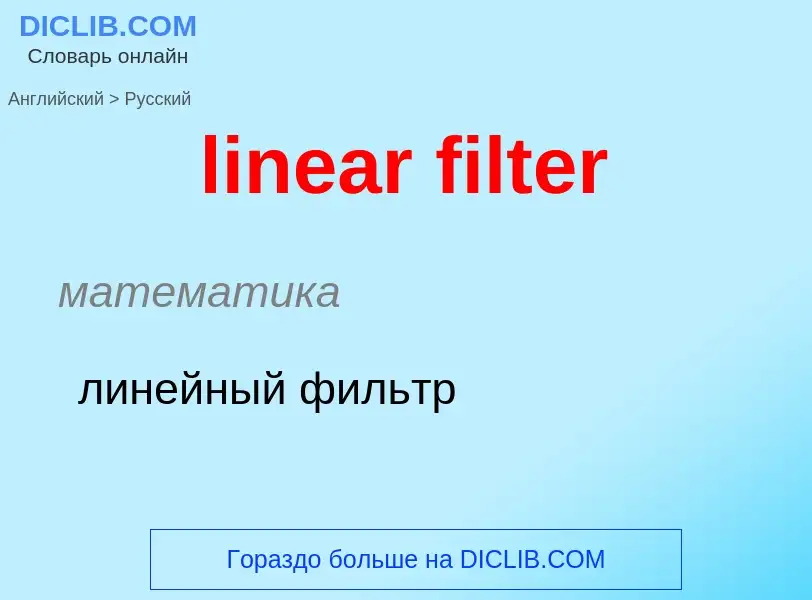Translation and analysis of words by ChatGPT artificial intelligence
On this page you can get a detailed analysis of a word or phrase, produced by the best artificial intelligence technology to date:
- how the word is used
- frequency of use
- it is used more often in oral or written speech
- word translation options
- usage examples (several phrases with translation)
- etymology
linear filter - translation to russian
математика
линейный фильтр
математика
нелинейный фильтр
общая лексика
съемочный светофильтр
Definition
Wikipedia
Linear filters process time-varying input signals to produce output signals, subject to the constraint of linearity. In most cases these linear filters are also time invariant (or shift invariant) in which case they can be analyzed exactly using LTI ("linear time-invariant") system theory revealing their transfer functions in the frequency domain and their impulse responses in the time domain. Real-time implementations of such linear signal processing filters in the time domain are inevitably causal, an additional constraint on their transfer functions. An analog electronic circuit consisting only of linear components (resistors, capacitors, inductors, and linear amplifiers) will necessarily fall in this category, as will comparable mechanical systems or digital signal processing systems containing only linear elements. Since linear time-invariant filters can be completely characterized by their response to sinusoids of different frequencies (their frequency response), they are sometimes known as frequency filters.
Non real-time implementations of linear time-invariant filters need not be causal. Filters of more than one dimension are also used such as in Image processing. The general concept of linear filtering also extends into other fields and technologies such as statistics, data analysis, and mechanical engineering.


![The 80A filter, mainly used to correct for the excessive redness of [[tungsten]] lighting, can also be used to oversaturate scenes that already have blue. The photo on the left was shot with a polarizer, while the one on the right was shot with a polarizer and an 80A filter. The 80A filter, mainly used to correct for the excessive redness of [[tungsten]] lighting, can also be used to oversaturate scenes that already have blue. The photo on the left was shot with a polarizer, while the one on the right was shot with a polarizer and an 80A filter.](https://commons.wikimedia.org/wiki/Special:FilePath/80a comparison.jpg?width=200)



![The ''LOMO effect'' imitates photos made with a low-cost Russian camera brand, named "LOMO". It is approximated by saturated central colors, blurred periphery, and darkened corners and edges ([[vignetting]]).}} effect. The ''LOMO effect'' imitates photos made with a low-cost Russian camera brand, named "LOMO". It is approximated by saturated central colors, blurred periphery, and darkened corners and edges ([[vignetting]]).}} effect.](https://commons.wikimedia.org/wiki/Special:FilePath/Verblühende Sauerkirsche.jpg?width=200)
